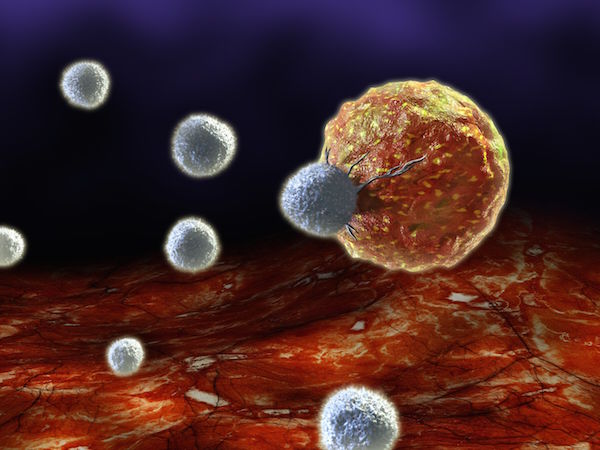
WEDNESDAY, Jan. 7, 2015 (HealthDay News) — Conventional wisdom has it that high levels of testosterone help prostate cancers grow.
However, a new, small study suggests that a treatment strategy called bipolar androgen therapy — where patients alternate between low and high levels of testosterone — might make prostate tumors more responsive to standard hormonal therapy.
As the researchers explained, the primary treatment for advanced prostate cancer is hormonal therapy, which lowers levels of testosterone to prevent the tumor from growing. But there’s a problem: Prostate cancer cells inevitably overcome the therapy by increasing their ability to suck up any remaining testosterone in the body.
The new strategy forces the tumor to respond again to higher testosterone levels, helping to reverse its resistance to standard therapy, the researchers say.
If confirmed in several ongoing larger trials, “this could lead to a new treatment approach” for prostate cancers that have grown resistant to hormonal therapy, said lead researcher Dr. Michael Schweizer, an assistant professor of oncology at the University of Washington School of Medicine in Seattle.
“It needs to be stressed that bipolar androgen therapy is not ready for adoption into routine clinical practice, since these studies have not been completed,” he said.
The report was published Jan. 7 in the journal Science Translational Medicine.
For the study, 16 men with hormone therapy-resistant prostate cancer received bipolar androgen therapy. Of these patients, seven had their cancer go into remission. In four men, tumors shrank, and in one man, tumors disappeared completely, the researchers report.
Overall, “50 percent of patients had declines in their PSA [prostate specific antigen] and 50 percent had shrinkage of their cancer,” Schweizer said. PSA levels are a standard signal of prostate cancer activity, as measured in a blood test.
Senior study author Dr. Samuel Denmeade is co-director of the prostate cancer program at Johns Hopkins University in Baltimore. He believes the new approach has benefits beyond its effect on cancer cells. That’s because restoring a man’s testosterone levels also reduced the side effects of hormone therapy, which include mood swings and not being able to have intercourse.
“For the most part, men said they felt great,” Denmeade said. “Most of the men felt like they had more energy. Men on hormone treatment who couldn’t have sex could have sex again, so they were very happy about that.”
And although testosterone levels alternated between high and low, the men seemed to tolerate the treatment well, he added.
Denmeade stressed that this treatment is not a cure, but a way to make men feel better and extend the time standard hormonal therapy remains effective. “Maybe men will live longer, but we don’t know that yet,” he said.
According to Denmeade, men enrolled in the study didn’t have any symptoms from their cancer, such as pain, and had been on standard hormonal therapy for an average of four years. They had also suffered a side effect of standard hormonal therapy — impotence — for at least one year.
Bipolar androgen therapy is probably not for “men who have not [yet] had any treatment for prostate cancer,” he added.
Moreover, the long-term effects or dangers of the therapy aren’t yet known, he said. Only longer, larger trials will help uncover any risks associated with the treatment.
And one expert worries that alternating testosterone levels could actually shorten men’s lives.
“A cancer cell could escape and grow, as happened in breast cancer when this method was tried with estrogen, causing early death,” said Dr. Anthony D’Amico, chief of radiation oncology at Brigham and Women’s Hospital in Boston.
D’Amico agreed with the study authors that bipolar androgen therapy is not ready to be used in clinical practice and doctors should wait for the results of ongoing trials before offering it to men.
More information
For more information on prostate cancer, visit the American Cancer Society.
Copyright © 2026 HealthDay. All rights reserved.

